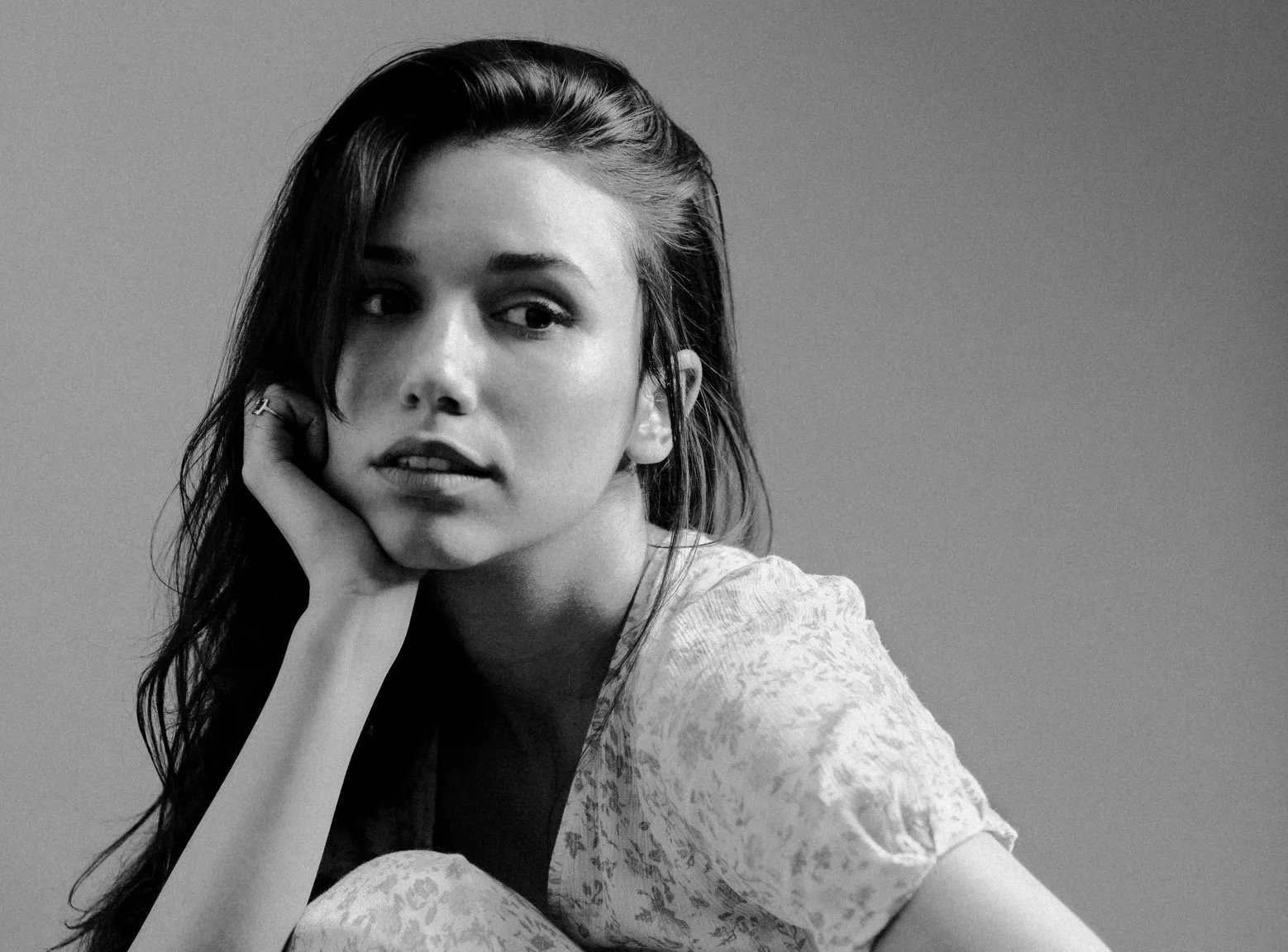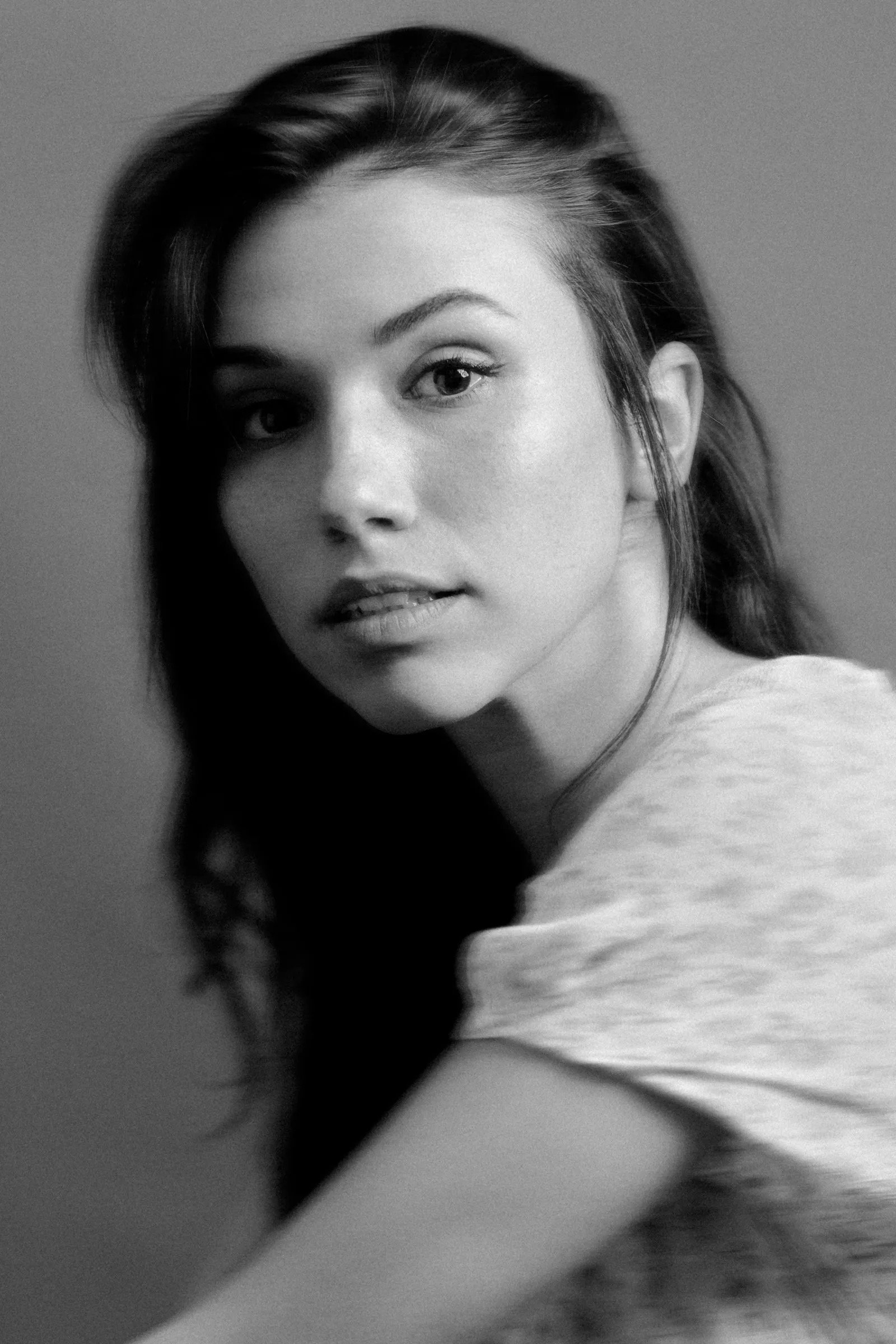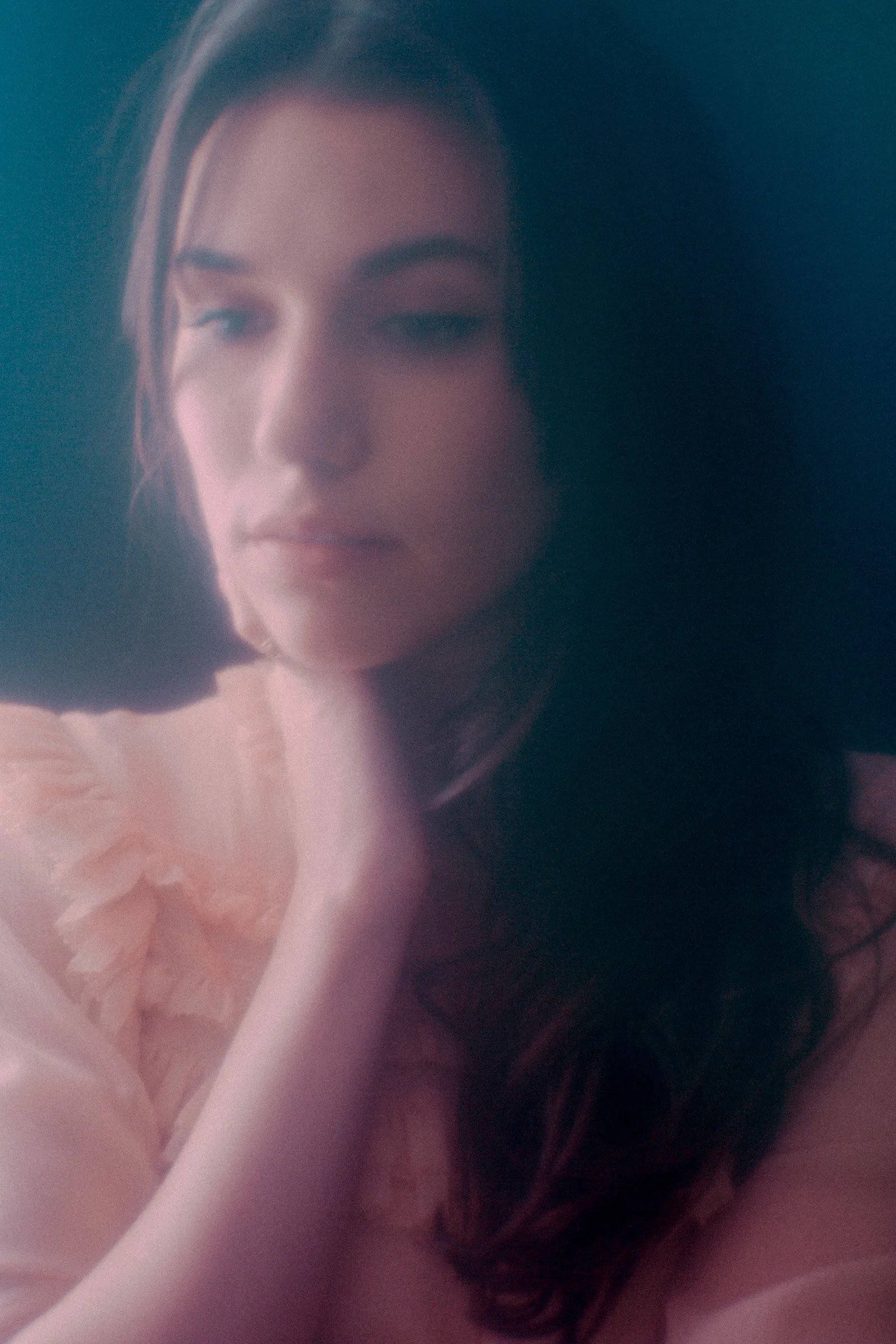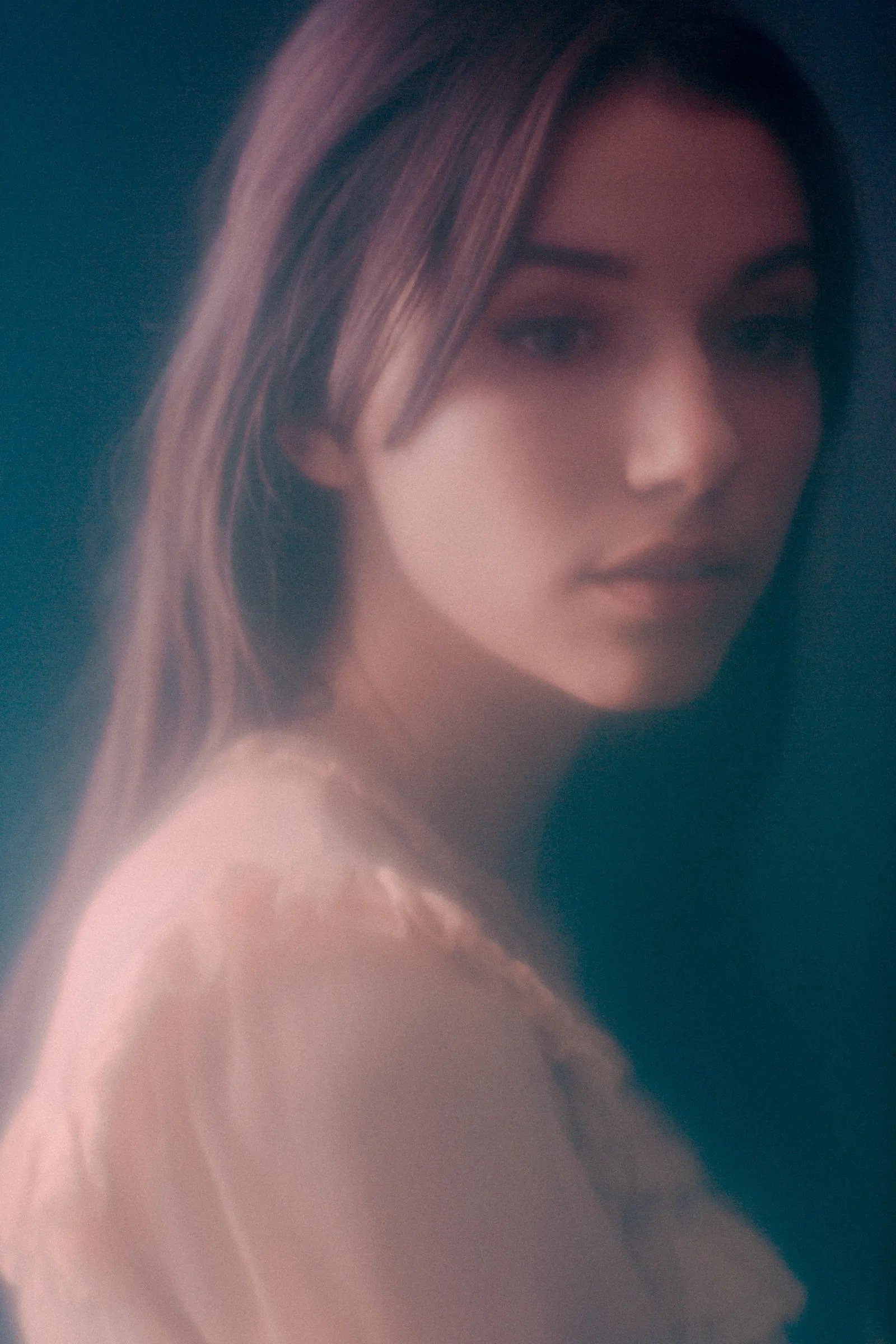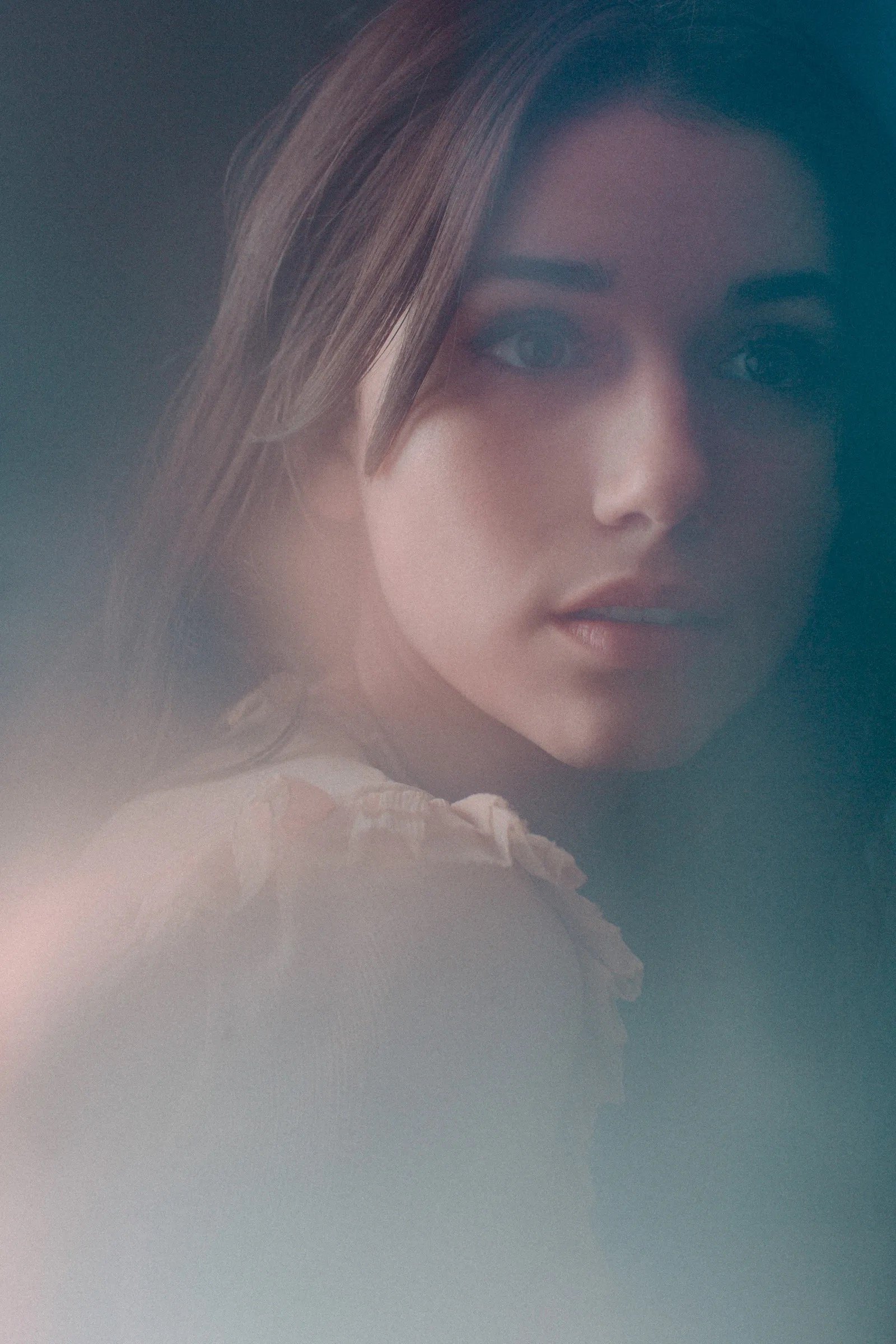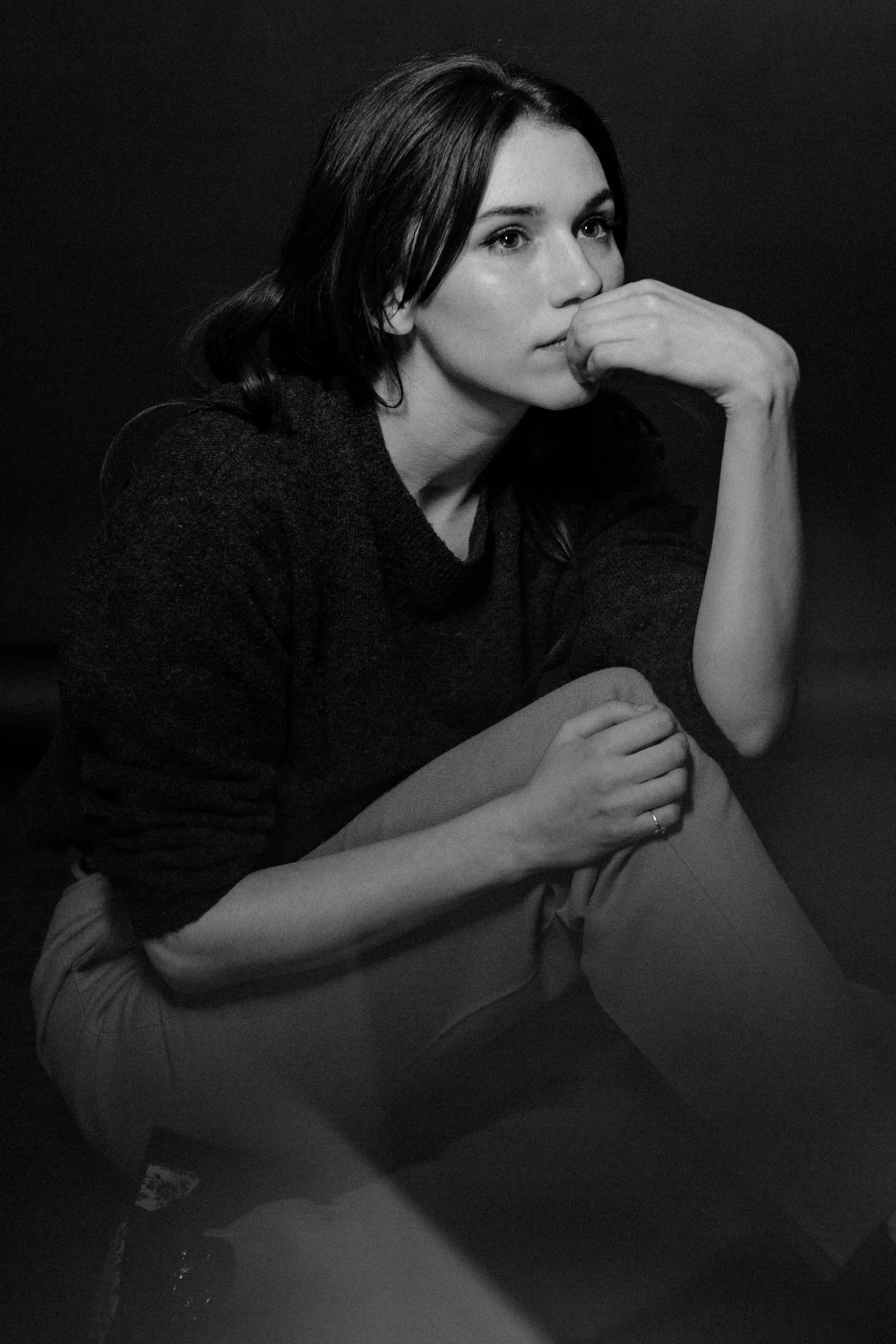Grace Fulton
In Reflection: A Conversation with Grace Caroline Currey
〰️
C: So maybe you can tell me a little bit about you and where you’re from.
G: Okay! [Laughs] My favorite thing to do. I don’t know if everyone is this way, but I’m the worst at writing bios or anything that’s a ‘tell us about yourself,’ because I don’t know where to start! I live in LA, but I don’t technically live in LA; I live in this little beach town — this little bubble. It’s very sweet. Growing up I trained to be a ballerina and that was kind of my trajectory.
C: Oh, wow. I didn’t know that.
G: Ballet ran its course though by the time I was 17 or 18 — entering adulthood. My body had injuries and I took some time off for them. I was also developing a more womanly figure as I got older — and body positivity has just recently come into the ballet spectrum. It definitely was not a thing when I was dancing. I just fell out of love with ballet because it started to take more than it was giving with injuries and everything.
Thankfully, I also had acting in my life. And while I was recovering from my dance injuries I spent a lot of time on the couch watching Oscar-nominated movies; I fell deeper in love with acting. So thankfully, when one door was closing, another door opened up.
I teach ballet now and I am a worship leader in a church, so I sing frequently. Acting right now looks like a lot of auditioning. Thankfully in the past five years, my acting career has gotten these deeper roots — I’ve started to see the result of a lot of hard work. I’ve been acting since I was six years old.
C: Was it kind of an even split between ballet and acting when you were younger or was acting almost like a back-up plan?
G: My mom always wanted me to have a childhood that wasn’t in the spotlight, so she kept acting a hobby, rather than an actual career path when I was growing up. I’d go to auditions, but I was dancing ballet day-in and day-out. It’s funny though, it was always an even split in my brain.
My friends would ask, “If you could pick acting or ballet, which one would you pick?” Acting was always something that I thought, I don’t want to let that go. But I was not good by any means in my middle school years. I was trying so hard to be a good actress, but I just lacked so much life experience and self-realization from being in a ballet room everyday. Also, I was a part of this private home-schooling group — like a private little art school, and I was just in this little bubble of working really, really hard in ballet and school work. I was kinda a hermit. All of the material I would get for auditions, I didn’t quite know how to connect with it. Then when I stopped dancing ballet at eighteen, it was like wow, there’s this whole world out there. I started teaching ballet and also started learning how to simply hang out with friends. [Laughs] And my acting got significantly better.
C: What kind of experiences stick out in your mind that prepared you to be a better actor?
G: At 18 — and I’m sure a lot of people can relate to this — I had some childhood trauma to confront that I hadn’t confronted my whole life. I had been pushing it down for so many years. So much so that I had actually wiped it from my mind and it came up when I was eighteen — I had the choice to either push it down again or confront it. The process of confronting it, going to therapy, working through the pain, working through all of it — really changed me as a human. Confronting that wound in my life and all that came with it: shame, fear, sadness, loss, anger— literally opened me up so much as a human. I suddenly had so much more understanding for the characters I auditioned for. A lot less judgment. A lot more compassion and empathy. I think diving into the darker parts of our lives and with the painful parts of our lives allows us to engage more fully, when you can make it through, you know?
C: Yeah, absolutely. That’s beautiful.
G: I think that the injuries with ballet and having a dream slowly die — that’s an experience that I didn’t confront, once again, until I was 20 or 21. It’s something I’ve still been processing the past six years. I didn’t really process it when I was losing it around 16, when I had my injuries and my body was changing. It was so hard to wrap my head around — that something I loved and dedicated, thus far, almost my whole life to, was not something that was going to be feasible for me going forward. I still take classes, and I teach ballet. I started teaching when I was 18, so it’s not like it’s completely out of my life, but even still, I think having that loss occur was kind of a cold, little wake up call for me. You can put in your best efforts but sometimes things don’t work out.
C: Yeah, I can’t imagine. I didn’t really stick with any hobbies that intensely when I was younger. I can’t really imagine what that’s like, being so young and having that vision for what your future is going to look like and seeing it change.
G: Totally, yes! And a lot of my friends growing up didn’t have a clear vision of what they were doing so I was very, I consider myself to be a bit of a strange child because I was very, very innocent and very much my age, but at the same time very responsible, very driven, and like a little adult pursuing working on set at a young age and knowing what I wanted to do and having the brain and the ability to look at ballerinas and think, alright, so that’s what it’s going to take and I’m gonna do that. And then it didn’t work out! I genuinely feel like I’ve lived two lives sometimes.
With acting at one point, I got insanely burnt out. I would say yes to every single audition, because I genuinely was excited! And fearless in auditioning. I was just like ‘let’s go, let’s go, I just want to work.’ I wasn’t booking for a little bit and I got really insecure and doubtful, and I had actually worked with an acting coach who made me question my ability to do what I do. And I remember walking out from her class — I was auditioning for this Frances Ford Coppola movie, and it was this exciting audition — I ran outside and saw her in her car and said, “What do you think?!” I was kind of asking her advice about it and then she stopped and she looked at me and goes, “Here’s the thing about you, when people meet you…you have an amazing team and they hype you up so much that when someone meets you it’s really exciting and you really are impressive, but then over time, you’re just not that great.”
C: Oh my god.
G: [Laughs] I remember just standing in that parking lot and going, “Oh, right, yeah. Oh, I...I think you’re right. I must be some secret let-down, some secret impostor.”
My dad picked me up and I’m in the car processing through what had just happened and within a couple minutes it dawned on me: I have to stop seeing this coach. I have lost my confidence being in her class these past months — I was so confident before this. I think she’s part of the problem of why I’m not as great these days because I’m doubting everything I do because she’s just… this isn’t a good fit for me. And I completely took a break from acting coaches and I went and coached myself. I didn’t want to show anyone my work, I was so scared of being told that I was not that great and that I was some sort of let down or something.
C: Yeah.
G: So I said, I’m not going to work with any coaches, I’m just going to coach myself, and I got the best feedback from casting directors! I had a director tell me to not let anyone over-direct me or over-coach me because my instincts were good. It was this season of me getting back in touch with myself.
It’s funny because when I started to see this acting coach that was so damaging for me, it was around this time that I was losing ballet and I wanted to get back into acting and be the best I could possibly be. I looked for a great coach and she was working with amazing people, and I ended up having such a damaging experience. Then I dropped that and went with my gut, back to my innate passion — and got the best feedback. That was the first time I experienced doubt and it was just literal, verbal words spoken to me. I auditioned for quite a few years and wasn’t booking anything and struggling. For me, a year or two years of no work is not a good sign when your manager’s agents are sending you on audition after audition after audition. You just start to question, okay, what’s going on? Am I just not bookable? What is it?
C: Yeah, totally. I get what you’re saying.
G: I remember crying in a coffee shop with my friend while playing Scrabble. [Laughs]
C: Oh my gosh. [Laughs]
G: “I don’t know what I’m gonna do, what if my managers drop me,” just full blown, you know. But I got this audition for a project that had no information on it except that [my character] was the oldest of some orphans. It was at a casting office that I had been to countless times and booked nothing with. But I just went, you know what, I’m just going to go in and do what I love, and whatever happens, happens. I went in, did my thing, and left. I found out a couple weeks later that I was getting called back and it was for a Warner Bros movie — a horror film — and that was “Annabelle: Creation.”
C: Oh, wow. Okay.
G: Which put me in contact with the director, David Sandberg, he came from making short films on Youtube and the studio saw him and asked him to make a feature length film from a short film he made called “Lights Out.” Then they gave him his second movie, which was "Annabelle: Creation." And from there, working on that film, the producer, the director, the casting director, wardrobe, the cinematographer — the same team made “Shazam!” My brother actually was the one that said, “Grace, David is attached to a project,” — because my brother knows comic books — he’s like, “there’s a character in that comic book that you look just like and you should really try to get this role or talk to David.” In my mind I didn’t want to use David. I like David, I respect David as a director, and I’m not going to go to him and be like “Cast me in your thing!” He’s going to have so much pressure to make this vision the vision he wants to make and I’m not going to put him in an uncomfortable situation. Make him feel obligated to cast me or something.
For that one person in the room to see my talent, I had to believe in myself. When we don’t believe in ourselves, it is when we are the least ourselves.
But that was an insane experience auditioning for “Shazam!” with the casting director, Rich Delia. When I came in for the audition, it was just me. No one else there. And I walked into the casting room and Rich was like, “We so strongly believe this is your character and you are Mary.” And he was bringing out the comic book and he’s like, “You look just like her.” He worked the scenes with me to put me on tape for David, our director. He so believed in me. I got in my car afterward and sobbed.
C: Oh my god. I have chills. [Laughs]
G: Because to have someone believe in you is really powerful. The hilarious viral thing, you know — Lady Gaga? [Laughs]
C: There can be 100 people in a room!
G: Yes! [Laughs]
Having anyone believe in your career, your life, your business — can be powerful. I actually wrote them a letter saying, “I would love to get this, but the experience of being in that casting room with you guys, and you guys believing in me, was just such a powerful experience for me. I am so thankful that you guys are in this industry — that I’ve gotten to audition for you guys and experience that belief.”
C: That’s badass. It speaks to the fact that there’s the one person in a room that believes in you, yes, but none of that would’ve happened if you hadn’t believed in yourself after working with that coach.
G: Oh my gosh. Oh my gosh. Isn’t that so true. I get it now. It’s that silencing all of the other opinions and listening to yours.
Then going for it. And of course, we have to accept other opinions at times and we don’t know everything. And there are times where we’re a little bit off the mark creatively and we need some good input — but all that being said, for that one person in the room to see my talent, I had to believe in myself. When we don’t believe in ourselves, it is when we are the least ourselves.
C: Beautiful.
G: Thank you, yeah. This is a gift to me. I’m being so selfish talking so much about this because it’s a gift to think of how far I’ve come and how many ups and downs and things that have been said to me, casting directors in a room shutting me down because I messed up on a line. It’s just interesting. In acting, the battle is just expectation.
Having expectations, trying to have something fit your expectations, missing out on something because you’re so focused on expectations. Or even abusing the thing in front of you because it doesn’t fit those expectations.
C: That sounds incredibly difficult. There’s a lot of resilience there. I also wanted to ask — you said that you were a worship leader. I think it’s interesting that you’ve been through a lot and you said that you’ve worked through trauma. I went through something similar when I was 19, and I feel like I really turned away from my spirituality. I feel like I was extremely religious and spiritual and I just rejected it after that. Is spirituality something that is a big part of your life?
G: It’s such a huge part of my life and I was very much involved with church growing up. And as I’ve gotten older, I’ve had moments of cynicism with my faith. Especially when processing through loss and pain. I mean, part of loss, like the description of it, like when therapists break it down, they talk about loss of faith — that comes along side of it at times. And I’ve, oh my gosh, the amount of times I’ve had seasons of just hopelessness and despair. Even now, I have here-and-there moments of total doubt. But somehow, when I sing, and I am in a space of just stillness, everything just goes away and I get this clear peace. It’s the smallest, little bits of hope, but it’s enough, you know?
C: Yeah, absolutely. I understand that.
G: And it’s interesting because I find myself — I’m a lot less legalistic than I was in high school. I have my first boyfriend ever right now.
C: Oh wow.
G: I’ve just been very picky and I’m very business-minded with my time. If someone didn’t seem like they’d be sticking around for a long time, I didn’t want to invest there. I bring that up because it’s been interesting being in a relationship with him because he’s also a Christian. We’ve been processing what we were taught as kids — what do we actually believe? What do we believe just because someone older than us told us to? I feel like I’m still just processing through so much.
I know that for me, right now, I’m in this place of kind of wanting to re-learn, who I believe God to be.
C: Yeah. And I think when it’s at its healthiest, one’s spirituality should always be evolving and there should be new ideas of what it looks like, so that’s beautiful.
G: Yeah! Absolutely. God is so vast and so huge that there has to be parts of His character and who He is that I don’t know about and maybe some other people don’t know about fully and I’m all about the mystery in faith. In all of it. I’m not super big on being sure I’ve figured everything out. There’s a lot of mystery. I’m hungry for that this year. I think it’s an ever-changing journey and I have friends in all different places — with faith or no faith — and we’re all just putting it together one day at a time. Or deconstructing it one day at a time! [Laughs] Taking it apart, you know? Putting it together and taking it apart.
C: That’s been my favorite part of my early twenties, to be honest.
G: Yes! Right!
C: I just feel like it’s visceral. Being a teenager, there’s that whole other level of visceral learning and experiencing things that you never have before. I think the early-twenties are similar.
G: Yes! Yes! I feel that hugely. I’ve been loving my twenties and 23. You mentioned that you had a similar experience with working through some things. Did you end up going to therapy?
C: Yeah, I did.
G: Isn’t it amazing?
C: I’ve been in therapy since 2015. That year was my first time ever going and yeah, it’s incredible.
G: It’s incredible!
C: The stuff I worked through then, and what I’m doing now — when I’m not really working through anything specifically and I’m kind of just learning, externalizing things — I think it’s just extremely important. I think anyone could benefit from therapy, to be fair.
G: I think everyone needs to go! I remember the first couple times I went, I walked out and I was like, oh my gosh, you all need therapy.
C: If you’re of the opinion that you don’t need therapy, it’s basically saying, I don’t need to learn anything else. That’s a point that I never want to be at as a human being, you know?
G: Seriously, yeah. Oh same. And it’s so devastating and invigorating seeing areas where I have been so unhealthy and damaging to people and myself and identifying that and going, okay, well now that this has been identified, there is a strong shot that I won’t repeat this behavior or I am going to now learn how to not repeat this behavior. And I love understanding things.
C: Yeah. Me too. And that’s a part of being a multifaceted human being. Even sometimes when I catch myself doing that, I just look at myself and I’m a fucking mess but thank god I’m actually thinking about this stuff. It makes me thankful for everything I’ve been through and where I’m at now. It makes me proud, you know what I mean?
G: Yeah! I think this year, end of last year, is some of the first times I have felt so accomplished and so proud of myself. Which is kind of sad, but I think it’s something about being in my twenties and learning more about myself, recognizing patterns. In 2020, my friends and I have this joke that it’s 2020: Grace Says No. [Laughs]
C: Oh my god, yes!
G: I’ve never been in this place, which is so exciting, when we’re in places we’ve never been before. I’m really fed up, and sick and tired of people pleasing, and I’m just absolutely outraged by it. [Laughs] I’m sick of it. It’s the last thing I want to do these days, which is huge for me! I don’t know how that happened. But I think it’s partly come about from being in the relationship I’m in.
When you’re with someone and they have to get to know you, you have to get back in touch with who you are and share that with them. I’ve really been, in a weird way, falling back in knowing and in love with myself through this boy falling in love and knowing me. And in a strange way, through the process, I’ve realized, I’ve been losing bits of myself these past few years. With friends, and with the things that I invest my time in and I have been so heavily driven by pleasing others. I don’t know how you are, do you struggle with this at all?
C: I’m pretty much the opposite. [Laughs] But that’s why I’m such a big proponent of others doing the same sometimes.
I think it’s something that I can fall into though — I think that I’m really hard on myself so a lot of times when I’m at my most unhealthy, I feel like I’m so anxious about what everyone else thinks of me that I can really slip into that. But generally, I feel like I’m very headstrong and I’ve never really had problems saying no.
G: That’s amazing.
C: I feel like that's incredible though, your year of no.
G: The way I can break it down is this: whatever got to me first was getting my yes. And then all that was left at the end of the day were leftovers for the things and the people that I cared most about. My life was being shaped by what chose me rather than by what I chose.
C: I mean, it’s beautiful. I almost got emotional while you were talking earlier, it’s just really beautiful. You just seem so aware of it and very thoughtful. That’s all you can really ask for. It sounds like you’ve really developed your intuition, your gut — you know, when to trust yourself.
G: Yeah, that’s been early adulthood, 18 to now early twenties. I feel like that’s been like my mission — developing my gut and developing my opinion. I mean, you can relate to this — when you started two different platforms, oh my gosh, I’m sure you probably asked advice from other people who’ve had similar brands for a long amount of time.
I personally felt at the whim of people who had been in this field longer than I had or were in positions of authority as far as providing the audition in the first place. I felt like, “Oh, I need to say yes to all these things,” which, I think you do early on.
C: I understand that for sure.
G: You do have to just go for it, but as you level up in the game [laughs], you have more options to say no. I think it’s also, as humans, we hopefully learn that, and this goes back to me saying no so that I can say yes to things I really care about. Learning to value your resources and make sure they’re there when it counts.
Instead of just spending it all the time and then you’re unhappy and miserable. It’s like I’m on this pursuit of happiness and it’s so simple — it’s not lying to yourself or others.
C: At the end of the day.
G: Yeah. [Laughs]
C: I really relate to that a lot. I had some people tell me when I was starting the Midnight Woman project, which is the anonymous submission platform, people would ask me — specifically men — “so, when you get these stories, are you gonna be like, fact checking them?” Because our platform was born out of the #MeToo movement, we have a lot of stories come in about assault and trauma. And I was like…fact check? Anonymous submissions? That goes against everything we’re doing. Even from the beginning, if I heard something like that, I knew that what I was doing was even more important because people should know that ‘fact-checking’ is not the standard when someone is sharing their stories with you. We have to work harder to be trauma-informed as a society. So just knowing when to use criticism as fuel to move forward — I relate. That was really important for me.
G: And that’s discernment, and like you said — building your gut. What you believe, and in yourself, and what you believe about yourself. I mean, I had a jumble of hurtful beliefs about myself, that I wasn’t worth this or good enough or that I couldn’t stand on two feet. I had this visual of what are those other girls doing in that room that I’m not doing.
Are they doing something else? Am I missing something? When in actuality, I needed to actually just focus on me and bringing me into the room. You’re gonna get those people that say these that’s just doubt, it’s just seeds of doubt, because we’re human, I think doubt is a very clear thing in a lot of us. There’s something powerful about fighting against doubt, and empowering to overcome it.
Half of the joy of feeling confident and accomplished is from having worked through the doubt.
C: Absolutely. Well, thank you so much for talking to me.
G: Thank you for listening!
C: I’m just really impressed and I’m glad we had this conversation. Selfishly, I somehow needed to hear your story. I did an interview early on for l'Odet with Hayley Williams, a musician, and we talked a lot about how she was in this time in her life where she’s digging and working through things so that other things can bloom. So when I was working on the project and editing the article, I was calling it and saving everything as, “The Springtime of Hayley Williams.” That’s not what we ended up putting on the article, but I feel like that’s such an accurate thing, so now when anyone’s in that phase — when they’re just learning so much and so much is blooming — that’s your spring. You really are doing the work and it’s paying off.
G: That makes me emotional. I feel like I’m in springtime now, but I also feel like the next time it’s like this, it’s going to be completely different. And it being completely different is revolving around the now and how I enjoy and register the springtime and take care of it. Life is just something really wonderful.
C: It is, it’s magnificent, really.
G: It really, really is. Engaging with life and not running away from it is maybe one of the scariest and most magnificent things we can do.
Grace is an actress living in Los Angeles. She's known for her roles in "Annabelle: Creation" and DC's "Shazam!"
Photos by Davy Kesey for his Reflections series, a photographic pursuit of vulnerable, multifaceted, and deeply personal portraits. 

